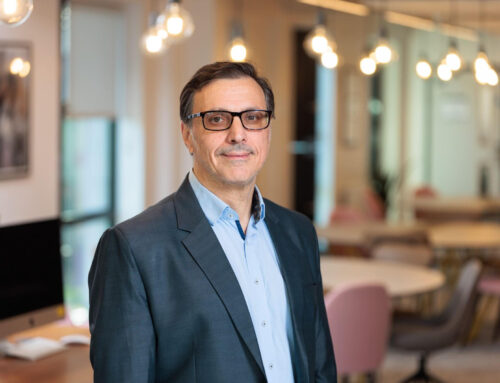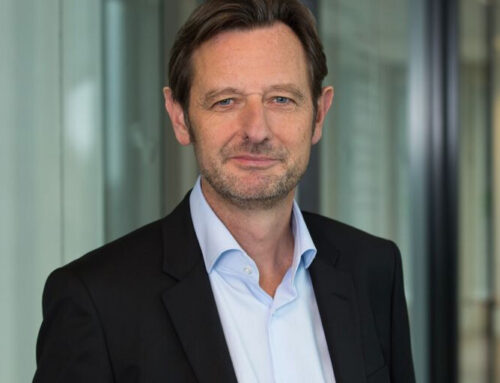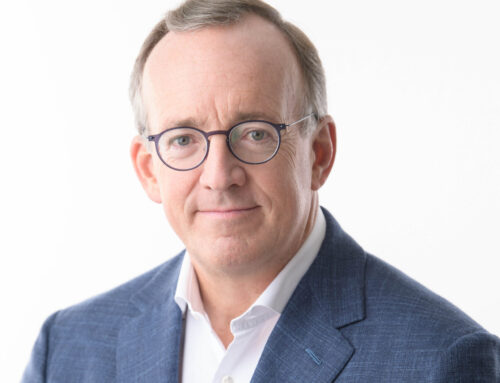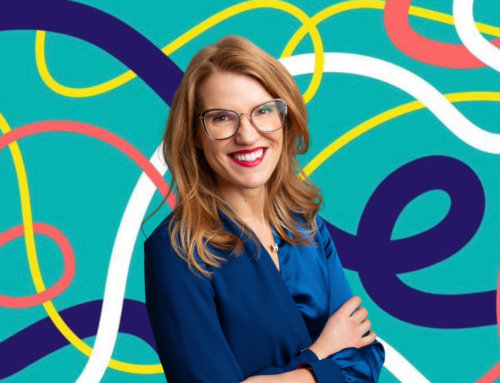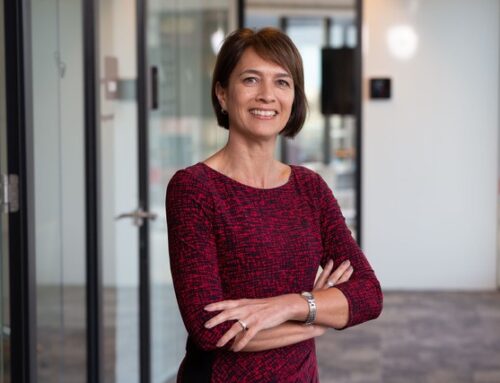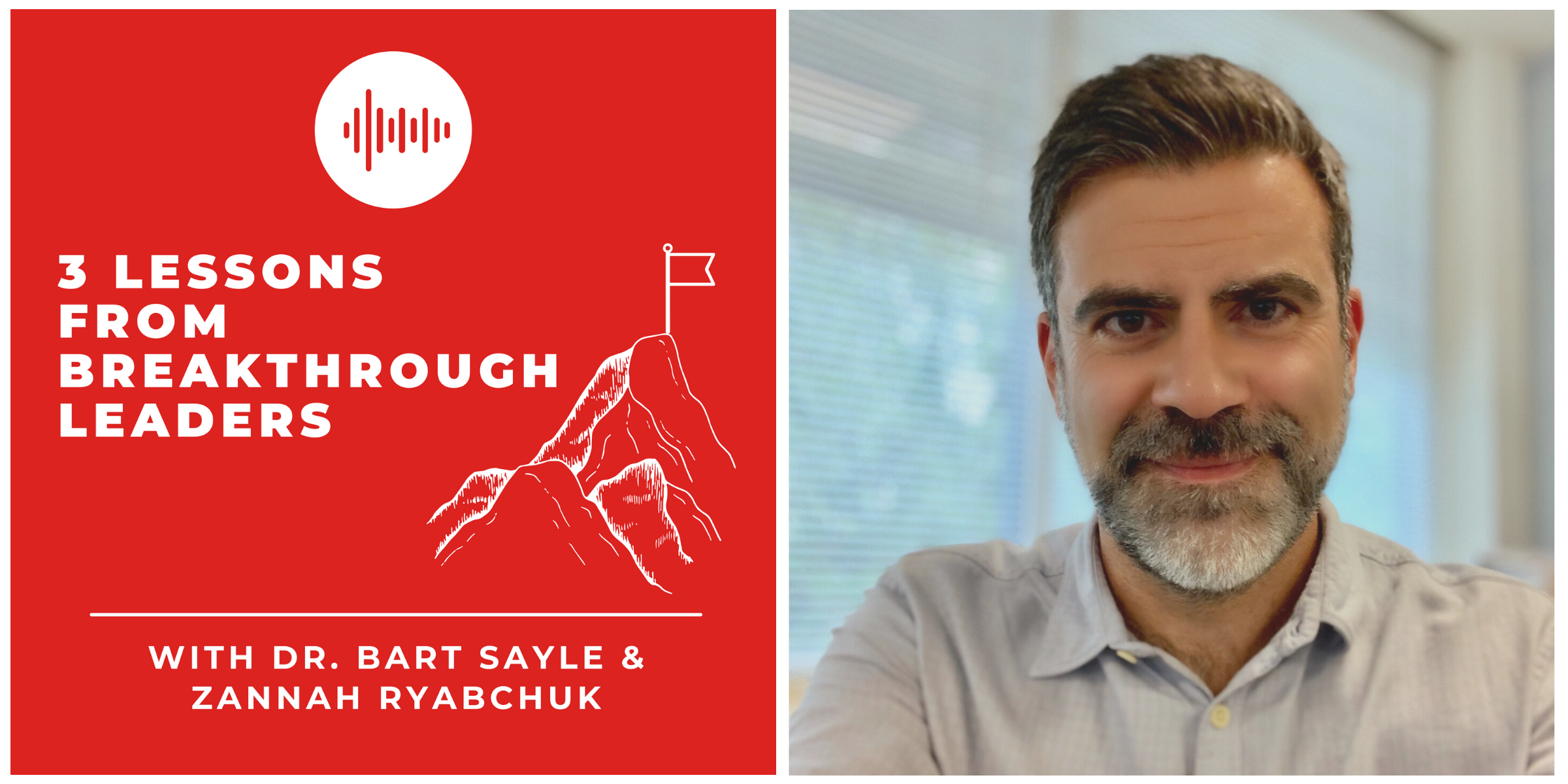
Listen to our latest podcast episode with Steve Challouma! In this conversation, we focus on brand stewardship and intentionality.
Steve is a General Manager at Birds Eye UK & Ireland for Nomad Foods, the leading branded business in Frozen Foods. He has spent almost 25 years in the frozen food sector and led the team which re-established Birds Eye as one of the UK’s most recognised brands.
You can find Steve on LinkedIn.
Listen to the S1 E9 ‘Brand Stewardship’ with Steve
You will learn these 3 lessons from Steve:
- Respect your history
- Intentionality leads to great opportunities
- How the longer road can sustain deeper rewards
This podcast was recorded in the autumn of 2021.
If you enjoyed this episode, make sure you subscribe to this podcast and please do leave us a review and rating on your player of choice. We will be updating you on upcoming episodes on our social media so remember to follow us.
Transcript of the episode
Zannah Ryabchuk
Hello, and welcome back to 3 Lessons from Breakthrough Leaders. I’m Zannah Ryabchuk, MD at Breakthrough Global.
Dr. Bart Sayle
And I’m Dr. Bart Sayle Breakthrough CEO and founder. We’ve spent 30 years developing the Breakthrough Methodology to transform companies who want to reach the highest level.
Zannah Ryabchuk
And in this podcast, we’ll get to the heart of that transformation, meeting leaders and creative talents to share three lessons that we guarantee will help you and your companies to unleash your potential. And Bart and I will take a moment to analyse the key takeaways and opportunities for Breakthrough thinking.
Dr. Bart Sayle
In today’s episode, we’ll learn from Steve Challouma. Steve is the General Manager at Birds Eye UK and Ireland. For Nomad foods, the leading branded business in frozen foods, he spent almost 25 years in the frozen food sector, and led the team which reestablished Birds Eye as one of the top UK most recognised brands.
Zannah Ryabchuk
And today, we’ll hear these three lessons from Steve: Respect your history…
Steve Challouma
There’s always this kind of belief that you need to reinvent and move on and discard and jettison the past. But actually, in some cases, you have that gold in your hands.
Zannah Ryabchuk
Good intentions lead to great opportunities…
Steve Challouma
Globally cod stocks were at risk. So we need to be very intentional to kind of confront this and do something major about it. Okay, we were headed towards a crisis.
Zannah Ryabchuk
How the longer road can sustain deeper reward…
Steve Challouma
There is all this sense of impatience actually, to quickly progress. And at the end of the day, you’re in a career for 30, 40, potentially 50 years in the future, right. So there’s not a rush. There’s not, I’ve never been in a rush. And I’ve been able to have the right balance between kind of career and personal life and all the rest of it has been in a really good harmony.
Dr. Bart Sayle
Lesson one, love thy brand.
Steve Challouma
What it comes down first and foremost, to from a business point of view, is respect for the history of the business and the brand. So where the brand has come from, its history, its heritage, and the value and trust that that brings. And when you are leading a brand like Birds Eye, you have to recognise that it’s had a history before you and that it will have a future after you. Right, so you are merely a steward. And that brings a responsibility and a privilege, quite frankly. And if you look at what our most successful products are now, they’re the products that were most successful in the 1950s and 60s, things like fishing products like Fish Fingers and garden peas, for example.
So I’ve always been respectful and conscious of where the brand has come from. And I think icons like Captain Birds Eye are an important exemplar of that actually, in in the years before Nomad foods, the business kind of jettisoned Captain Birds Eye so very important brand equity from the past from the 1950s. Yet there was a, there’s always this kind of belief that you need to reinvent and move on and discard and jettison the past. But actually, in some cases, you have that gold in your hands. So on the one hand, you’ve got to respect the past, but you also have to respect that habits change, and you need to stay agile and adapt as well. So really, the trick and the, in the revitalization of our brands was to kind of respect where the brand had come from, but to reinvent it to be relevant for modern day needs. And that’s what we did. And it’s been incredibly successful.
Dr. Bart Sayle
That’s great. Your brand was a very important brand in my life. You know, I was brought up in Liverpool, and I was brought up on Fish Fingers, and it was Birds Eye, Fish Fingers. I can remember when we were kids. We could tell if it wasn’t Birds Eye.
Zannah Ryabchuk
You can tell.
Dr. Bart Sayle
You can tell. But that aside, it’s one of those real legacy brands, certainly in Britain, and I, I loved what you said about that you’re a steward of that, because, you know, it was there before you came and it will be the after you’ve gone and I’d like you to just say a little bit more about it’s a it’s really the first time I’ve heard that with such meaning as you being a steward of the brand and so what what what what are your responsibilities in that?
Steve Challouma
Well, I I’m quite an analytical person. And I always see things in in terms of numbers. Okay? If you look at how many meals were present in, in the UK every year, it’s 1.5 billion meals a year, feature one of our products, okay, so there’s 4 million meals, if you were to divide that into days, it’s 4 million meals a day have one of our products, whether it’s a Fish Finger, a Yorkshire pudding, whatever it is, and actually just to visualise that, and how that manifests itself in homes around the country is just, that just blows my mind. Okay, even Fish Fingers is 1.8 million Fish Fingers a day.
Steve Challouma
You just, you just start to think about that. And you just visualise the role that it plays at the centre of a family or household. And all the conversations that happened at that tea time table. It’s humbling. And it’s quite overwhelming actually. Or the Sunday lunch or roast dinner on Sunday with our Aunt Bessie’s, kind of Yorkshire puddings and roast potatoes. I mean, there’s nothing everyone has for memories, it’s of a roast dinner, it’s possibly the most emotional dinner of the week, we have our brand line which is caring is the hardest thing we do for our Aunt Bessie’s, which is our strap line for that brand. It’s the ultimate show of love and care to your family. And when you think of all the pots and pans and all that hassle of making a roast, you’ve got eight different components and different vegetables and everyone’s got their own special different way. Or even a pizza, having a pepperoni pizza with your friends watching the Champions League final.
I mean, we just kept we’re just present at so many moments where people are bonding and together. And that’s, that is quite humbling and overwhelming. But then with that comes also that responsibility that you’re playing in terms of both at a micro level on people’s nutritional well being, which is, you know, such a key driver of why I’ve stayed with this business so long. Alright, so we sell, we sell vegetables, and this nation, we don’t eat enough vegetables. We’re all right, we’re all right with fruit vegetables are difficult. So when when I wake up in the morning, so how do we sell more vegetables, or make vegetables interesting. So those micro, keeping our nation healthy and fed and kind of good nutrition, but also those bigger, those bigger themes that are becoming more important in food in food sustainability, packaging, recyclability. And the benefits that freezing brings, which actually in the life last five or six years have really come into the for the theme of food waste. When I started 25 years ago, people didn’t really talk a lot about food waste. But now it’s a massive, rightly so, a massive topic. And actually, by freezing food, you avoid food waste completely. And all those vegetables that get soggy in the back of your fridge, or the chilled ready meal that goes off past its sell by date.
So there’s a huge kind of emotional link to that. And like you but I grew up with, you know, Birds Eye beef burgers and Fish Fingers. And you know, then I was a student and it was waffles with beans on top of it nice fried egg or whatever. And again, it’s the circle of life and then you grow up, I met my partner at work as well, my wife and and we’ve had three kids, and now we’re serving them Fish Fingers, and you go through that circle. So it’s a beautiful thing. And I’m a bit, that’s such a, that’s probably a principal driver of what I’m excited as excited working on this brand, these brands today as I was 25 years ago, and it’s something I’m always conscious of when people join the business is to, to lead them to that kind of aha moment for the brand and, and capture that. That kind of essence of what the brand stands for and what it what it means for them as well get that sense of purpose for them. And when they’ve got that, oh my goodness, it’s so powerful. And they feel so proud to work for the business. And they’ll really get, they really get an intuitive sense of the product and go the extra mile. So it’s if you can harness that in the business, it’s so valuable within the business as well.
Dr. Bart Sayle
It’s so inspiring to hear Steve talking about his company and his people. And his brand with such passion and such emotion.
Zannah Ryabchuk
It’s true because finding real meaning and importance in what a brand delivers is hugely motivating or can be demotivating for team if you don’t have that behind kind of your mission for why you’re doing what you do. And talking about these special moments that Bird’s Eye and getting to shape and be part of kind of elevating this food into treasured memories really, really resonates with Steve I know it resonates with the teams that he works with and actually it resonates with me. We’ve had far too many conversations about about Fish Fingers over the course of recording these episodes because there’s so many memories built up in it. Some examples that really have stuck with me from where we’ve helped clients to reinvent their purpose and create much more meaning behind what they’re actually delivering include the shift from a pet food organisation that was really, really focused on selling just pet food. And by moving that towards pet care created a whole new world of opportunity for them. And it shifted the focus from being about the pet, which seems slightly less inspiring to being about the person, the person behind the pet, who was gonna be able to care for their pets more effectively, and give all of that extra kind of love and attention. And of course, it was very, very lucrative for them to create that shift, as well as made them feel that there was more meaning behind the work they did every day. It puts it at a much, much, much higher level.
Dr. Bart Sayle
Lesson two start with intentionality.
Zannah Ryabchuk
You mentioned earlier intentionality, which is a concept that we use a lot and we talk about a lot. We kind of embed into organisations, what does intentionality mean for you?
Steve Challouma
Intentionality for me, is solving problems and turning from problem into into action. One of the phrases that’s really stuck with me and is a great example of intentionality is the phrase enlightened self interest. Okay, I’m sure you’ve come across that concept before. But this idea that you do well, by doing good, and by satisfying a broad range of stakeholder needs, and where you’d have an intersection, if you like, have a commercial insight, and then the consumer insight, and maybe another insights, societal insight, that’s where magic can happen. So I’ll give you an example of that. On Fish Fingers, it always comes back to Fish Fingers.
If we go back, historically, Fish Fingers and when you were growing up, but but also when I was growing up, Fish Fingers were all cod. But when we got to the early 2000s, cod actually got into quite a risky situation, from a sustainability point of view. Because globally, there was an over reliance on cod and cod stocks were at risk. Not withstanding them that commercially, because stocks, were going down the cost of cod was was rising steeply as well, we’ve got to a position where not only that there was an existential risk to that business in the long term. If we didn’t do something. It wasn’t commercially viable. Okay, so we need to be very intentional to kind of confront this and do something major about it. Okay, we were headed towards a crisis. Now, what we did was, we discovered in our hands that there was another species that we could use in Fish Fingers.
And this was called the Alaskan Pollock, okay. But Alaskan Pollock is very, very similar to cod organolepticlly. So if you were to do a blind taste, most people couldn’t tell the difference. And so we came up with the idea, well, what if we transferred a lot of our Fish Fingers from cod, to Pollock, which was far more sustainable, and far more widely available, and much cheaper? Then there was the question of how you market that and finding a hook in order to attract consumers to it. And what we discovered was that, yes, you know, visually, still flaky and white, which is what people you can imagine in focus groups, people want your Fish Fingers to be white, flaky, and the breadcrumb and all the rest of it. But the Alaskan Pollock had double has doubled the amount of Omega three in its flesh, then cod. So what we did is we launched alongside our cod, instead of calling out Pollock, we called them the Omega three Fish Finger and position them as a, as a healthy alternative to a cod Fish Finger and we stopped promoted, cod was still available, but really went heavy on the Alaskan pollock.
That was a fantastic initiative. I mean, in the first year, there was 4000 tonnes of cod, that we were able to, you know, shifts supply in terms of from cod to Alaskan Pollock, it was a far cheaper species even though it was just as good quality. So commercially, it was it was really positive. And from consumer point of view, there was this benefit of bringing Omega three which may give three and especially at that time, it’s great for kids and developing brain brain health and to now that Omega three business or Pollock business is two and a half times the size of the cod. And that’s allowed cod stocks to to replenish, actually, and they’re no longer under the same threat, and we only source kind of sustainable cod and Pollock but that’s, that’s, that’s a really strong example for me of, you know, facing a crisis and existential crisis, but kind of marrying a consumer insight and a product insight that actually ended up being very profitable for the business as well.
Zannah Ryabchuk
What Steve’s describing here is a breakdown. A Breakthrough, we love breakdowns, because we believe they’re the source of our greatest breakthroughs.
Dr. Bart Sayle
Most people, when they hear break down, they want to avoid it or deny it. Instead, at Breakthrough, we teach people to embrace your breakdowns, declare your breakdowns, because actually, the breakdown is your source of your break through. There’s two pathways. One is the breakdown pathway, where we deny and we avoid. And as we do that, we live with that current situation, which gradually declines and becomes a crisis in the breakthrough pathway. We start with intentionality. And we need to recognise the breakdown, declare that breakdown, and then create a team that’s motivated to get a breakthrough. And once we do that, we add new positive energy to it. We create new possibilities out of that energy. And then we create new opportunities out of those possibilities. Lesson three, care is a commitment…
Zannah Ryabchuk
What is it that’s kind of kept you in this role? And what would you say are some of the benefits of actually hanging on and kind of weathering some storms and then kind of building on that mastery in one particular area?
Steve Challouma
I think there are, there are a few things that have kept me there that long. And that keep me motivated. And some we’ve touched on already. But the most fundamental thing is I love business, right. And this is a proper business that manufactures and then product, you can visit, you can visualise a little graphic of a factory and the stuff comes out of the factory and goes in the shop, and then you sell it and there’s cases and they take it home. And so I just love it, it’s a classic good business that has a profit, a P&L and all the rest of it. But that’s not distinctive to our business. Right. But it’s, it’s a perfect example of that. So some of it we’ve spoken about already, which is that that kind of purpose, and that that role that our brand plays and the reach it has, and just just the pride and the role it plays in my life. I mean, I eat food several times a week, right. And it just touches all age groups, all income brackets, and cultures and the rest of it and that breadth of choice. So, you know, that’s, that’s at the fundamental level, I think there’s certainly benefits for the business of having this, this kind of long tenure in terms of, you start to, you start to develop that deeper kind of latent knowledge of the category and what consumers want, what drives what drives the category.
And that’s not something you can teach. So you have a much data that you have, there’s a kind of underlying, intangible sense that you have of what might work or not, it’s a bit dangerous, because the risks, the risks with someone like me is, you know, a lot of new ideas come to the business, they tend to be ideas that have come before. And so I’m always conscious not to kind of say, oh, we did that in 1997 or 2004. And it didn’t work. Because sometimes with ideas, you know, their time hasn’t come in, there’s been loads of examples of that, right? So that’s the kind of business and the benefits and the basis. And then I think the other thing is, it’s always given, it’s a business thats always given me opportunities. And I’ve been happy and I’ve been able to have the right balance between kind of career and personal life and all the rest of it has been in a really good harmony. And it’s been a really, it was it was hard early on in my career because I had all my friends who are from school or university and, you know, say when I was seven or eight years in and they were like, really you’re still at Bird’s Eye.
And you know, you can imagine, you know, all the kind of slightly more aspirational brands and businesses and advertising agencies and, and kind of more insurgent brands that kind of some of my friends were working for and they were pressuring me, you’re going to become a bit stale and then your cv is gonna look terrible and and a bit staid. So I’ve always felt that bit of pressure to, that you have to kind of move to progress or that you’re going to be perceived somehow as as narrow minded or, but I don’t know that hasn’t held me back. I think it comes back to this this point of passenger and player actually. So if I get to that position where I think I’m plodded, where I think the business doesn’t have opportunity, and I can’t be stretched as a leader, then then I’ll consider it. But I don’t think I can’t see that ever coming. Because I think as much as the business itself that’s self generated as well. And you know, when I have considered it, there’s nothing, nothing else has come close in terms of in terms of that core purpose, I haven’t been able to be kind of encouraging children to eat vegetables. But it’s something I always talk to kind of junior, you know, less experienced people in the business, there is all this, this kind of sense of impatience actually, to quickly progress. And at the end of the day, you’re in a career for 30,40, potentially 50 years in the future, right. So there’s not a rush. There’s not I’ve never been in a rush. And I’ve, I’ve done a lot of different functional roles, sales marketing, category, and you’ve got enough time to kind of get breadth as well as progression. And so I’ve always had that sort of patience. And the business’s has allowed me to have that richness.
Dr. Bart Sayle
That was wonderful. In that experience that you’ve developed. And I liked the fact that you said that, you know, sometimes you don’t have to rush. And and in that experience that’s been so important to you. What are the what are the key leadership principles that you’ve developed for yourself, and adopted and shared and helped other people to grow with?
Steve Challouma
I think the I think the most powerful thing for me is the importance of respect for people, clearly, I’ve come from a position where I’ve been a junior within the organisation to lead in the UK. And when I was a junior, I couldn’t dream that I’d be doing it, it just seemed so inaccessible, that those kind of bigger roles and intimidating in a way. And I’ve always been careful as you sort of grow in an organisation to keep that sense of connection, and down to earth and groundedness, with everyone in the organisation, whatever value they bring big or small, because that’s where strategies develop, that’s where strategy is implemented. So one thing I’ve always always been conscious of, and that’s become more even more important in the last 18 months, is to build very, very broad personal connections with people across the business. Because I think the danger is you grow within an organisation, you lose that, and you become a bit inaccessible, and you become a bit unapproachable. And I don’t, I don’t like that. I partly remember what it was like, but I want people to be able to approach me and my teams, in order to bring their their whole self to work. And through that, that’s where you’ll get the extra 1% from people, you know, those little shifts that will have big impacts. And, you know, if you look at how respect manifests itself, right, it’s, it’s listening. It’s affirmation. It’s empathy. And it’s gratitude and consideration. So all of these more human elements, I think, have become so so important as a leader and, and that’s how I, that’s how I really love to lead. And that I think, is critical in terms of how I approach this respect.
Zannah Ryabchuk
Steve touched on a concept that is very, very, very familiar to the people who work with us. It’s called passengers, prisoners and players, we call it the three P’s. Essentially, in every single organisation that we work in, in every single room that we walk into, there are three kinds of people who show up. The first of those kinds of people are the passengers, the passengers, they just want an easy ride, they want to have a good time, they don’t want to put too much effort in. And it’s exactly the same in their organisations, there are passengers in every single organisation, people who are really kind of the excess weight, they’re just sticking around till the end of the month, so they can pick up their paycheck, the second of the peace of the prisoners. And if you can imagine that the passengers are the excess weight the prisoners, they’re adding active resistance, they’re the ones who when we walk into a room have got far more important things to be doing. They’ve got far better places to be. And and we see them in every single organisation to the people who are very, very grumpy in a meeting, and usually don’t have many ideas about how we can fix the problems that they’re spotting all over the place. But of course, finally, there’s the third P which are the players. These are the people who are playing to win and they’re playing to win for the team not just for themselves. These are the make it happen people and again, we see them in every single organisation in every room. And there are millions and millions of players all over the world who are making the most of their lives. This is a great way of identifying different levels of intentionality. So ask yourself, where in my life or my work am I being a passenger? Where am I being a prisoner? And how can I shift to be more like a player? Now let’s get into the hot seat.
Zannah Ryabchuk
So Steve time for the hot seats, what is the most exciting thing you’ve ever done?
Steve Challouma
Okay, well, I’m going to share my professional claim to fame here, which is, I’ve met all seven, Captain Birds.
Dr. Bart Sayle
I am not worthy. That is incredible.
Zannah Ryabchuk
What inspires you in life?
Steve Challouma
I would have to say my family and my children. They, they bring me down to earth. They keep it real, they bring me joy. So I love their curious mindset, their naive questions and their take on the world. And they always remind me to be curious, and I love learning with them. So earlier this week, my my middle son, he was doing he was doing something for school on Mount Rushmore, you know, in the US where they carved the president’s head, and I didn’t really know and I loved I loved doing that homework with him. And I found all these fascinating facts that I won’t bore with you now, about this. Behind Abraham Lincoln’s head, there’s a massive storeroom that was supposed to stole America’s kind of key secret documents and but it was never finished. So yeah, it’ll be my it’ll be my children.
Zannah Ryabchuk
Finish this sentence success is …
Steve Challouma
For me, success is balance. Okay, so the analogy I would like to use here that I always like to think about is a graphic equaliser. So when you’re listening to favourite music, right, there’s the bass and treble and you’re always wanting to optimise those different aspects in life. You have your career, you have your family, you have your parents, you have your hobbies, you’ve got your community, you’ve got your health. So you know life is that you know, success is getting the right kind of balance of those elements on your own personal graphic equaliser.
Zannah Ryabchuk
I couldn’t agree more actually, I think that’s exactly my definition of success as well. It’s to be balanced. Definitely. All right. I think that’s it. Steve, thank you so much for your time today. And thank you so much for um, for agreeing to join us on the show. It’s been a fantastic pleasure having you.
Dr. Bart Sayle
Oh it’s been great. I’ve really enjoyed it. And it’s just been it’s just been like down the pub speaking. Really? That’s the best way Definitely.
Steve Challouma
Thank you. I appreciate that. I’ve enjoyed it. Okay, bye.
Zannah Ryabchuk
Thank you for joining us for today’s episode. Do make sure you hit the subscribe button and join us next time for another 3 Lessons from Breakthrough Leaders. You can reach out to us at Breakthrough Global on LinkedIn or Facebook, via Twitter at Radiant Clarity, or Instagram Global Breakthrough
Dr. Bart Sayle
And we’d love to hear your feedback and your own leadership stories. We’d also love for you to share this episode on your own social media and review and rate this podcast on your player of choice as we want to spread these transformative lessons as wide as possible.
Zannah Ryabchuk
And thanks to our production team Julia Soltysova over at Breakthrough Global and Robin Leeburn of Fairly Media and of course, thank you for listening.
Transcribed by https://otter.ai

